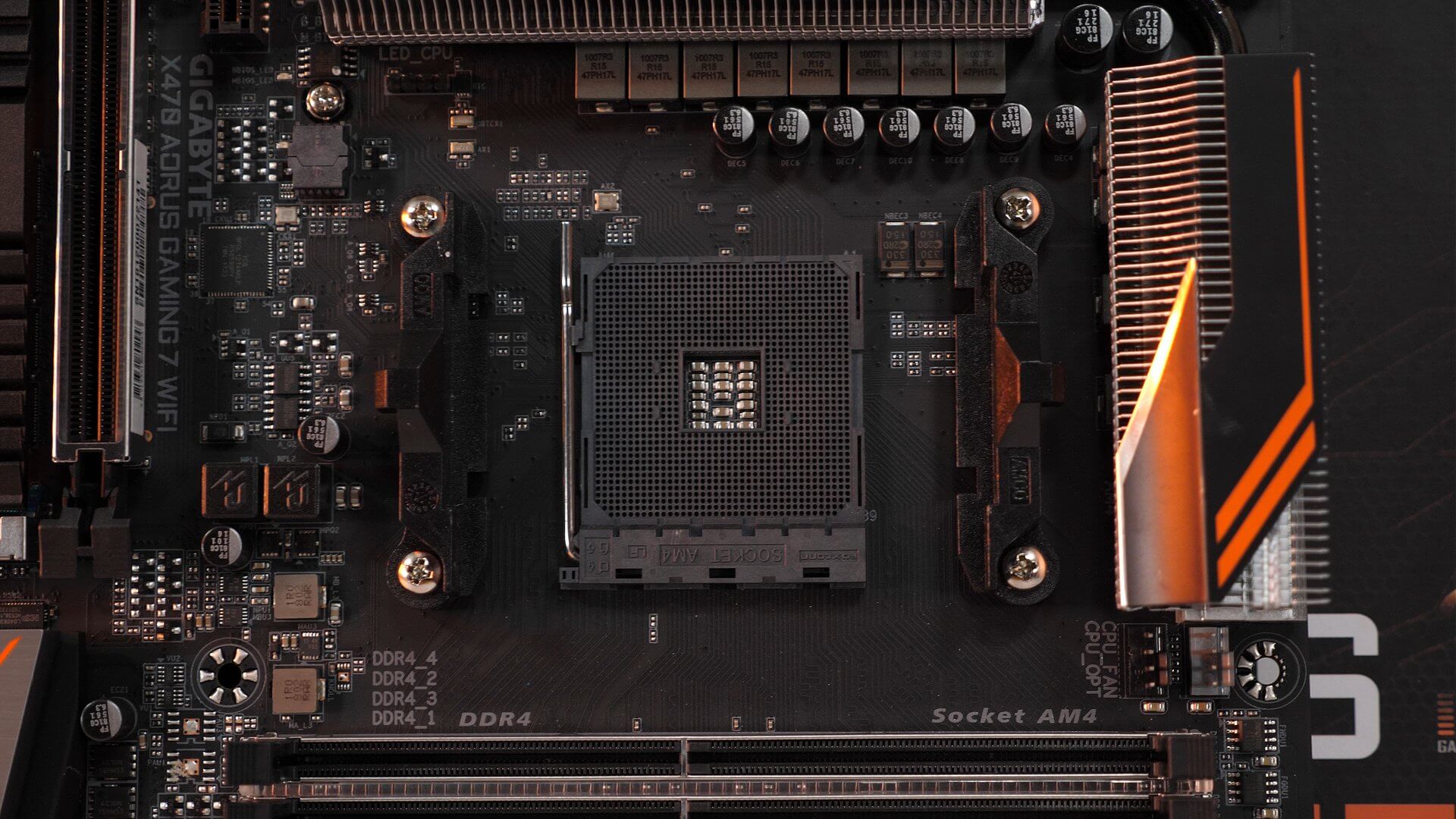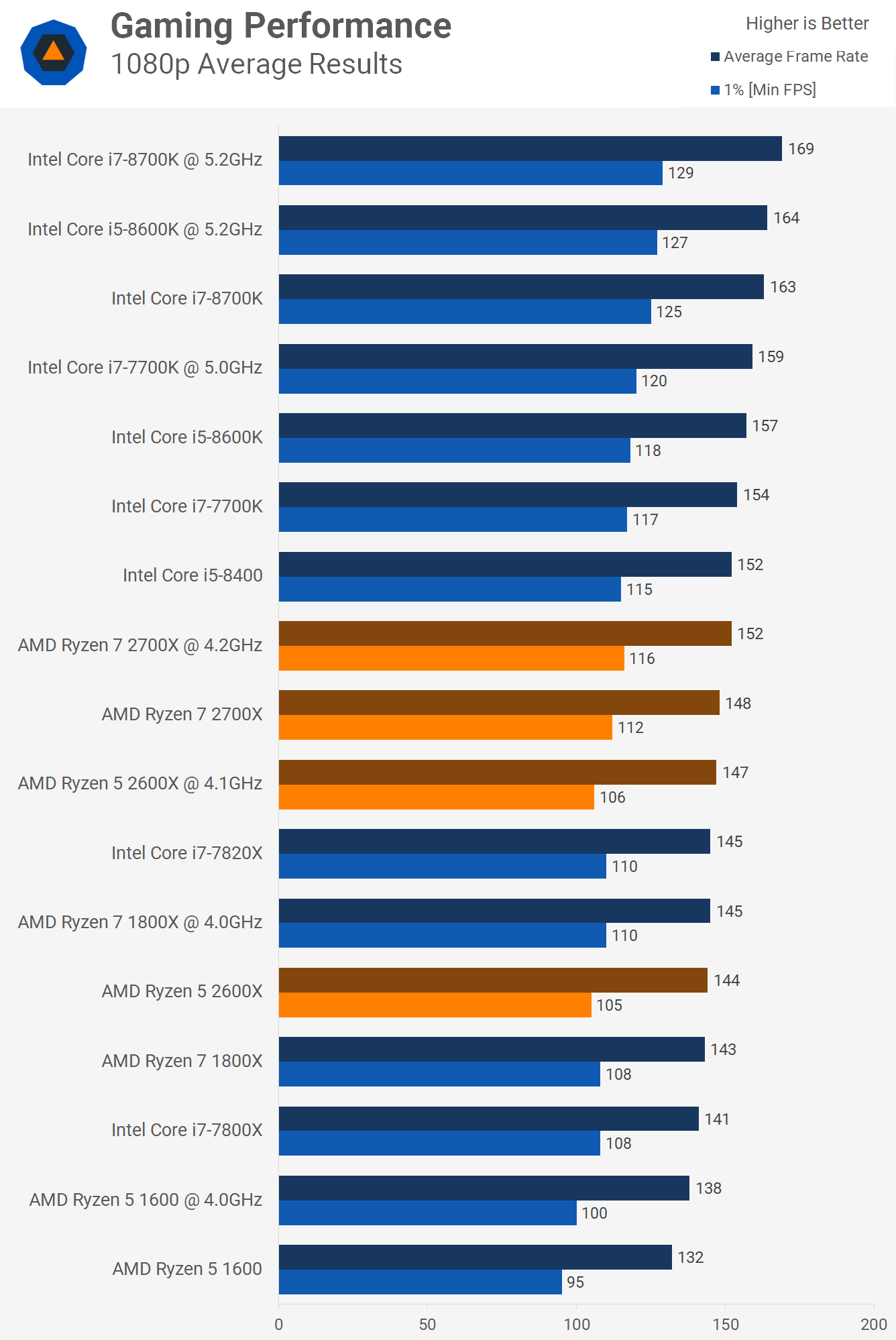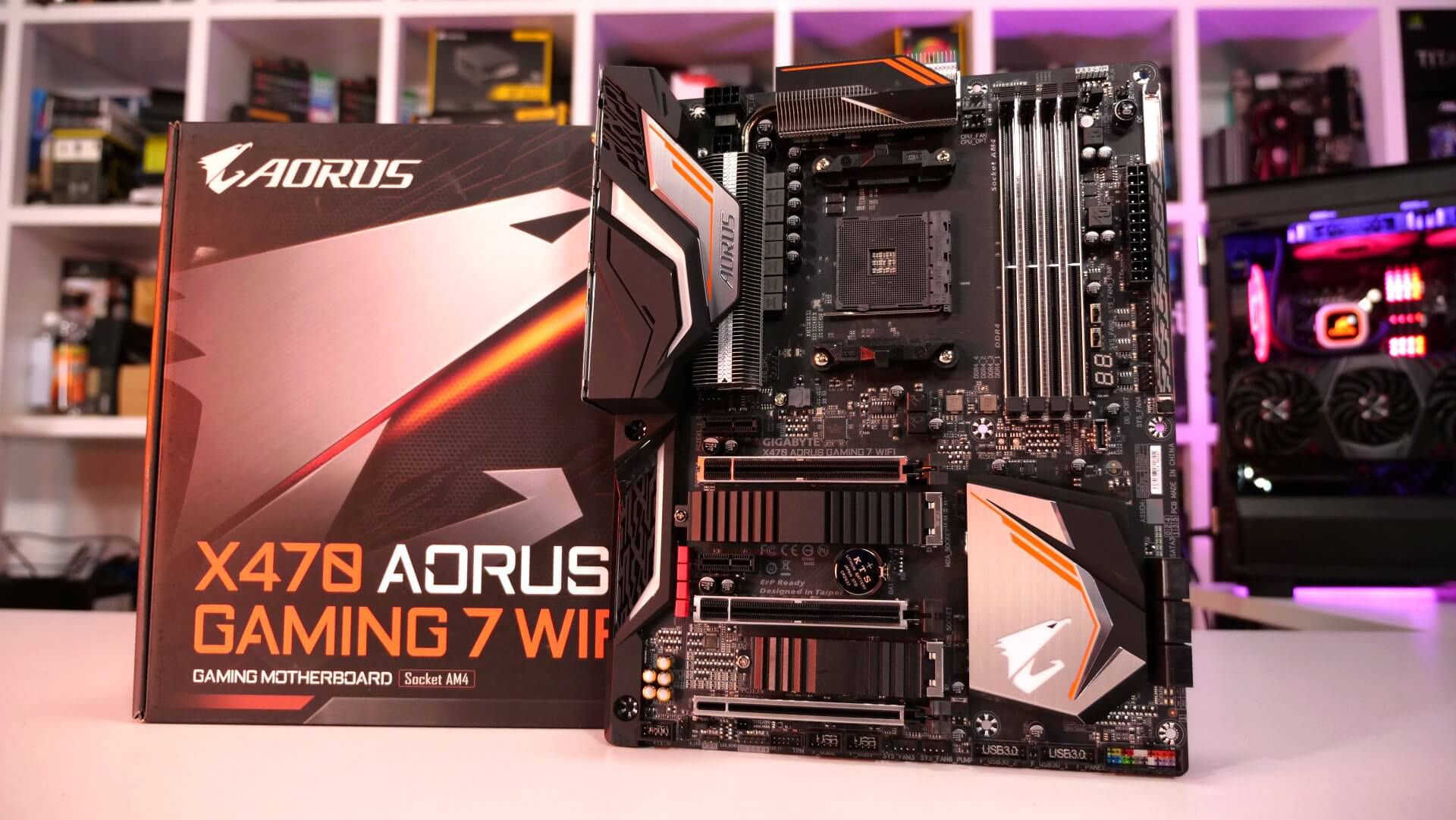AMD Ryzen 7 2700X & Ryzen 5 2600X Review > Closing Thoughts and Recommendations
Closing Thoughts and Recommendations
After a huge time investment into this debut review, I yet experience like there's so much more that I want to exam. However, we've covered the essentials and it should provide a good idea of how the Ryzen 7 2700X and Ryzen five 2600X compare to the current-gen Intel CPUs.
Every bit was the case with first-gen Ryzen, AMD offers seriously strong performance in cadre-heavy productivity workloads. Both stock and overclocked configurations of the 2700X beat the 8700K in virtually workloads, though there are times where the higher clocked Coffee Lake CPU will pull ahead. It'due south fair to say they trade blows.

The 2700X did have the reward of slightly higher clocked memory in these tests, but I accept gone dorsum and checked a few of the benchmarks with the 8700K using DDR4-3400 memory and the gains are extremely small-scale, sometimes non-existent -- and remember, the 3200 memory operates at tighter timings. I also realize that the 8700K at v.2GHz is without question showing a best case scenario for Intel, but that's kind of the point.
In a lot of the gaming benchmarks we meet that when the 2700X is overclocked to 4.2GHz, which I also feel is a best case scenario for AMD, 2nd-gen Ryzen struggles to hang with even a stock 7700K. The depression latency ringbus actually is rex for games and this will continue to be a trouble for AMD until Intel is forced to utilise the mesh interconnect architecture in one case games call for significantly more cores, so don't hold your breath on that ane. I'm not proverb it won't happen, information technology absolutely volition, it just might not exist as soon as AMD is hoping for.

Here'southward a quick expect at some averages beyond the games tested at 1080p using various quality settings with the GTX 1080 Ti. Here the 2700X and 2600X look very competitive though we are only seeing a 7% improvement for the ane% low performance for the 2700X over the 1800X and fifty-fifty less when looking at the average frame charge per unit. Even so, it's well worth noting that the 2700X simply managed to edge out the 7820X and that's a big bargain.
Overclocking second-gen Ryzen CPUs produced pocket-size gains and the 2700X was only able to keep pace with a stock 7700K, though that is a peculiarly skilful gaming CPU. The 2700X was also only 4% slower than the 8600K and 10% slower than the 8700K which is a good result for AMD. Over again in a lot of these tests nosotros were GPU bound but we're also using a GTX 1080 Ti at 1080p then it's hardly extreme GPU bottlenecking.
Ability consumption really was all over the identify. In some workloads the 2700X only used slightly more than than the 1800X, while in others it used quite a chip more. What's primal to note here is that 2d-gen Ryzen CPUs are at least on par with the Skylake-X series in terms of performance per watt and were often a little meliorate.

I should also note that the Ryzen v 1600 and Ryzen vii 1800X performed the same on both B350, X370 and X470 motherboards, but memory support was meliorate on the X470 lath. I had a few stability problems with the newer Ryzen chips when installed on 300-series boards, simply that could just be a BIOS issue.
If you're primarily using your PC for gaming and seek loftier frame rates with a high refresh display then Intel Coffee Lake Cadre i5 and Core i7 processors offering the best experience. You'll need to be happy upgrading your platform every few years, simply I suspect those dumping loads of money on a Core i7 and a height notch Z370 motherboard with cooling to match probably are.
In a number of modern titles, the six and eight-core Ryzen CPUs are capable of delivering a great gaming feel on 144Hz displays. Moreover, if you're going to exist using a GTX 1080 or in particular a GTX 1070 or slower, and then the difference between these CPUs is negligible in mod titles.

For applications as we noted earlier the 2700X stacks upwards well confronting the mighty 8700K. However the 2600X -- well that basically crushes the 8600K and past extension all Java Lake Core i5s. Compared to the 8600K, you lot're looking at upwards to 40% more processing power out of the box. Of course, I am talking about cadre heavy workloads here. At that place are instances where the 8600K pulls ahead, simply at almost it was simply a few percent faster when it did.
So as I said... not a lot has changed here.
Every bit expected, second-gen Ryzen fries are a little better at everything compared to the first generation. I already preferred the Ryzen 5 1600 over the Core i5-8400 with the sometime seeming like the better all-rounder and I now prefer the 2600X to any of the Coffee Lake Core i5 parts, for the same reasons.
Moving on to overclocking, second-gen Ryzen are a lot less exciting than Coffee Lake CPUs. However, information technology'due south besides a lot more than practical. Yous can overclock all cores of the 2600X to 4.1GHz using the box cooler, while the 2700X volition as well do four.1GHz using a basic air-cooler. I'thousand non 100% sure what kind of overclock the box cooler can support on this chip, I'm still testing. But the point is, y'all can look reasonable temperatures without having to spend big bucks on cooling.
Without resorting to delidding and mega-cooling, the 8700K is skillful for ~5GHz at best. Yet, you will only run across a few percentage drib in performance from 5.2GHz to 5GHz.

Helping second-gen Ryzen parts forth are the X470 motherboards. I wasn't sure what to look here but the Asrock and Gigabyte boards I had on hand for testing were rock solid, making for a good upgrade packet from AMD. As if things weren't already competitive in the CPU market, they are at present and 2022 is shaping up to be ane of the best years in recent history. AMD looks equally if it's going to be in great shape this year.
Shopping Shortcuts
- AMD Ryzen 5 2600 on Amazon, Newegg, Microcenter
- AMD Ryzen 5 2600X on Amazon, Newegg, Microcenter
- AMD Ryzen 7 2700 on Amazon, Newegg, Microcenter
- AMD Ryzen vii 2700X on Amazon, Newegg, Microcenter
- AMD X470 Motherboards on Amazon
Pros: Great productivity and all-around operation. Stock and OC'ed 2700X are more often than not faster than the 8700K. Ability consumption on par with Skylake-10. Newer X470 boards available.
Cons: Stability bug on the 300-series boards. Overclocked and generational gains are express for gamers. The R7 2700X's Wraith Prism cooler struggles during heavy OCs.
Source: https://www.techspot.com/review/1613-amd-ryzen-2700x-2600x/page6.html
Posted by: fishersaity1935.blogspot.com


0 Response to "AMD Ryzen 7 2700X & Ryzen 5 2600X Review > Closing Thoughts and Recommendations"
Post a Comment